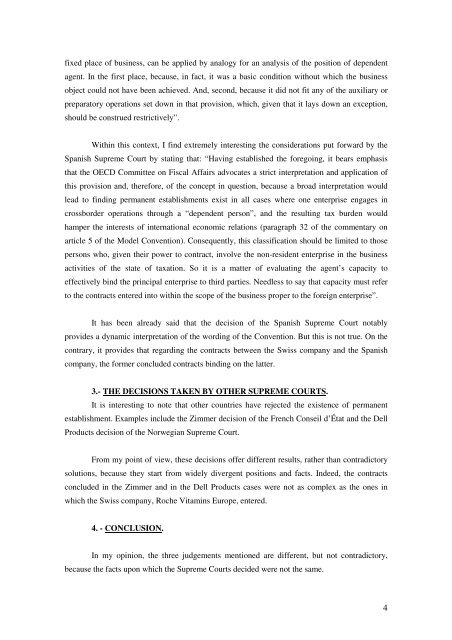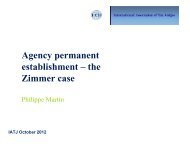Agency Permanent Establishment - Spain - Iatj.net
Agency Permanent Establishment - Spain - Iatj.net
Agency Permanent Establishment - Spain - Iatj.net
- No tags were found...
You also want an ePaper? Increase the reach of your titles
YUMPU automatically turns print PDFs into web optimized ePapers that Google loves.
fixed place of business, can be applied by analogy for an analysis of the position of dependentagent. In the first place, because, in fact, it was a basic condition without which the businessobject could not have been achieved. And, second, because it did not fit any of the auxiliary orpreparatory operations set down in that provision, which, given that it lays down an exception,should be construed restrictively”.Within this context, I find extremely interesting the considerations put forward by theSpanish Supreme Court by stating that: “Having established the foregoing, it bears emphasisthat the OECD Committee on Fiscal Affairs advocates a strict interpretation and application ofthis provision and, therefore, of the concept in question, because a broad interpretation wouldlead to finding permanent establishments exist in all cases where one enterprise engages incrossborder operations through a “dependent person”, and the resulting tax burden wouldhamper the interests of international economic relations (paragraph 32 of the commentary onarticle 5 of the Model Convention). Consequently, this classification should be limited to thosepersons who, given their power to contract, involve the non-resident enterprise in the businessactivities of the state of taxation. So it is a matter of evaluating the agent’s capacity toeffectively bind the principal enterprise to third parties. Needless to say that capacity must referto the contracts entered into within the scope of the business proper to the foreign enterprise”.It has been already said that the decision of the Spanish Supreme Court notablyprovides a dynamic interpretation of the wording of the Convention. But this is not true. On thecontrary, it provides that regarding the contracts between the Swiss company and the Spanishcompany, the former concluded contracts binding on the latter.3.- THE DECISIONS TAKEN BY OTHER SUPREME COURTS.It is interesting to note that other countries have rejected the existence of permanentestablishment. Examples include the Zimmer decision of the French Conseil d’État and the DellProducts decision of the Norwegian Supreme Court.From my point of view, these decisions offer different results, rather than contradictorysolutions, because they start from widely divergent positions and facts. Indeed, the contractsconcluded in the Zimmer and in the Dell Products cases were not as complex as the ones inwhich the Swiss company, Roche Vitamins Europe, entered.4. - CONCLUSION.In my opinion, the three judgements mentioned are different, but not contradictory,because the facts upon which the Supreme Courts decided were not the same.4





